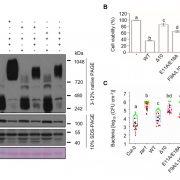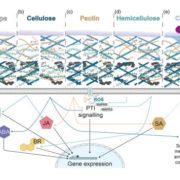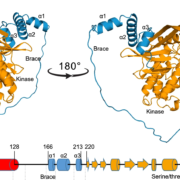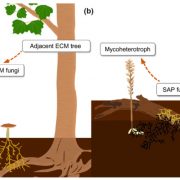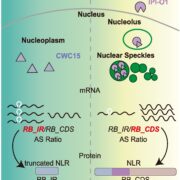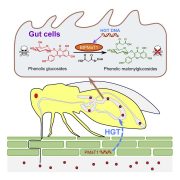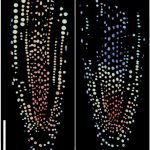Perception of Agrobacterium tumefaciens flagellin by FLS2XL confers resistance to crown gall disease (Nature Plants)
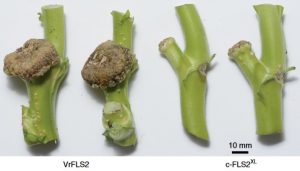 FLS2 is a well-characterized cell-surface receptor that recognizes a short epitope found on most bacterial flagellin proteins. The plant pathogen Agrobacterium tumefaciens, causative agent of crown gall disease, deviates strongly at this epitope region, and so is generally not recognized by FLS2 receptors, facilitating its pathogenicity. Fürst et al. set out to try to identify novel FLS2 genes that might recognize this epitope from Agrobacterium tumefaciens. They found a wild grape species, Vitis riparia, that is resistant to the pathogen and has both a standard and a non-standard FLS2 gene. The non-standard variant recognizes both standard epitope and the Agrobacterium tumefaciens epitope, and was named FLS2XL (for extended ligand). Introducing FLS2XL into tobacco plants conferred resistance to crown gall disease. This new finding can provide a new strategy for resistance in plants susceptible to crown gall including fruit trees, raspberry bushes, and grapevines. (Summary by Mary Williams) Nature Plants 10.1038/s41477-019-0578-6
FLS2 is a well-characterized cell-surface receptor that recognizes a short epitope found on most bacterial flagellin proteins. The plant pathogen Agrobacterium tumefaciens, causative agent of crown gall disease, deviates strongly at this epitope region, and so is generally not recognized by FLS2 receptors, facilitating its pathogenicity. Fürst et al. set out to try to identify novel FLS2 genes that might recognize this epitope from Agrobacterium tumefaciens. They found a wild grape species, Vitis riparia, that is resistant to the pathogen and has both a standard and a non-standard FLS2 gene. The non-standard variant recognizes both standard epitope and the Agrobacterium tumefaciens epitope, and was named FLS2XL (for extended ligand). Introducing FLS2XL into tobacco plants conferred resistance to crown gall disease. This new finding can provide a new strategy for resistance in plants susceptible to crown gall including fruit trees, raspberry bushes, and grapevines. (Summary by Mary Williams) Nature Plants 10.1038/s41477-019-0578-6


